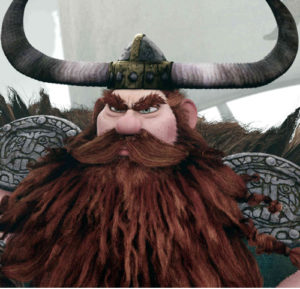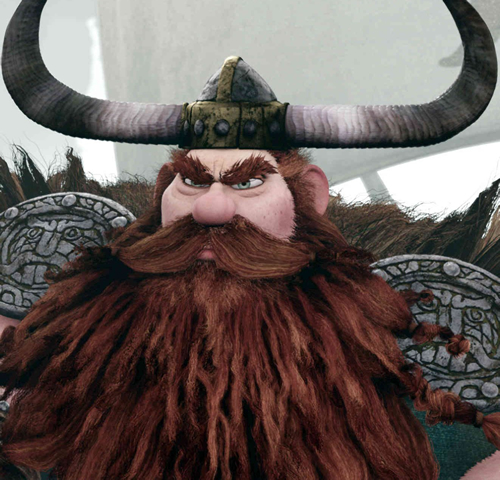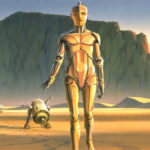Sex In The Story 7: Patri-Archetypes

Have feminists or patriarchalists killed fatherhood? Not at all. Fathers are alive and well.
Here’s a timely topic: fathers. In speculative stories, it seems the more-epic a story gets, the more likely the author tries to explore Father Issues.
Oh wait. Fred Warren already explored that, and not even near to Father’s Day.
In that case, this column will take off from his, along with reviving the Sex in the Story series — which explores, not steamy scenes of romance and such (I am so sorry), but gender differences seen in stories.
Fathers are all over most speculative stories. These can be done well or done poorly.

- How to Train Your Dragon explores father issues very well.
In a recent re-viewing, I noted how much the 2010 Dreamworks animated film urges audience to sympathize not only with Hiccup, the awkward teenage son of Viking village leader Stoick the Vast, but with Stoick himself. Just when you think this may be another teen-proves-idealistic-youth-triumphs-over-traditionalist-age, the film subverts that with warmth, humanity, and mutual apologies and learning between father and son. Fantastic animation and acting only aids this theme.
- The Disney 1964 musical film Mary Poppinshandles father issues a bit poorly.
Of course, this is a classic of music and animation, and I enjoy this movie too, but let’s admit it: Dick Van Dyke does a bad cockney/British/Scottish/South England/North England whatever accent he does. But besides that, the movie’s moral is that Daddy Needs to Learn a Lesson. I’m still not sure what that lesson was. Anyway, the story extricates him from any consequences by deus ex machina. I know, I’m a grump.

- The Star Wars film series is the modern-classic example of father issues done right.
The original trilogy has defined a stereotypical “bad father” and his redemption arc for several generations already. Everyone knows (and misquotes) “No, I am your father.” Still, its resolution is that good-son-redeems-bad-father, a twist on the “prodigal son.” Do I suggest that Luke should have learned from Darth Vader? Not really. But any other story exploring father issues could twist the template yet again.
- Finally, The Chronicles of Narnia: The Voyage of the Dawn Treaderfilm (Fox/Walden, 2010) shows “father issues” done horribly wrong, or rather, barely done at all.

Great actor. Simplistic subplot.
- Someone decided the movie needed to show King Caspian doing something, or having a Redemptive Arc, instead of simply captaining the ship and being kingly. (Furthermore, it wouldn’t do to show film-Caspian building up to what the book showed was his desire, all along, to go to Aslan’s Country suicide-style and forsake his responsibilities as Narnia’s monarch. It just wouldn’t do because … because … because giving anything to see Aslan’s Country just doesn’t make sense, right?)
Thus, we get a serving of Father Issues in a little plastic tray, slid out from a thin cardboard box. Peel off the cellophane and you get Caspian pining for his lost father, and kinda-sorta wanting to see him again. With no real change in his desires, he suddenly makes an about-face and realizes he shouldn’t want this. As a friend of mine put it: why did Caspian not even mention his mother and wanting to see her?
That brings me to my central theme: that despite the stories that explore Father Issues half-heartedly, or that — like the Dawn Treader movie — merely toss them on top to try to seem epic or profound, it’s fascinating that authors want to explore these at all.
Isn’t out society past such themes? Some people would think so:
- According to secular feminists, liberated women should be doing even more victory laps after “taking over” news media, academia, and Hollywood with their rhetoric.
- According to Christians who have experienced bad fathers, or even notions of “patriarchy” that abuse Scripture (and people, especially women), we should focus more on the truth that we’re one in Christ, and not worry about specific “roles.”
These can’t be right. Too much evidence proves many in our culture think otherwise. Deep down, we suspect that, even if many fathers stink, they should be great:
- Among Christians, father-oriented teaching and books are more popular. (And I think we may have finally left the Wild at Heart notion of “real men are mushy poet types who fancy themselves studs even as they’re whimpering over how much Jesus their lover loves them and bemoaning their inevitable Wounds From Fathers.”)
- Almost all speculative stories, including “secular” ones, fall all over themselves to explore Father Issues, and to present dads or father-figures as good role models.
-

A “trolldad” plotting good-natured mischief on his children, who evidently enjoy being his victims.
Tween-or-older “millennials” who hang out on “meme” websites (such as this one) have a unique desire to credit, tribute, venerate, and repeat the purported pranks and wisdom of a character commonly dubbed “Trolldad.” This is one case that surprises me most. If we’re really such a feminist, family-rejecting and fatherhood-detesting culture, why this eagerness to exhort dads as awesome figures? Even more, why do these folks constantly make themselvesinto the butt of the jokes?
So, why do you believe speculative stories, in particular, are so apt to explore issues of fathers and children? Which father-oriented stories have you enjoyed and why? Which ones haven’t done so well? And finally (perhaps most vital), will you defy niche-trench-digging and give your own father a Christian speculative novel for this Father’s Day?










































Great article! You’ve shared some interesting thoughts and examples…articles like these are why I’ve been reading Speculative Faith for about two (or maybe three?) years now!
I guess I have such a high standard for father figures (he must be a leader of the family; he must be wise and responsible; he must be understanding even if his son has crazy hobbies) that when Stoick didn’t meet all of them, I simply didn’t notice the need for understanding and forgiveness between both father and son. Come to think of it, the same situation occurs in the cartoon Cloudy with a Chance of Meatballs. Oh, and Finding Nemo! (It’s actually more obvious in that film; Marlin learns to loosen up, and Nemo learns that his dad is braver than he’d thought. Nemo also suffers the consequences for ridiculing his father).
Nevertheless, I’d like to see a film in which the teen realizes that he was wrong and his father was right. Because parents have more wisdom and experience, and can easily see the pitfalls of whatever weird dreams we teens might have…
Perhaps the most responsible father figure I’ve seen on screen is Pongo the dog from the 101 Dalmatians cartoon. Pongo comforts his wife/mate, protects his family from Cruella De Ville, and takes the initiative to search for his kidnapped puppies. (Interestingly enough, he adopts the other puppies who escaped the De Ville place). Also, both Pongo and Perdita set out to find and protect their kids, so there’s a great husband/wife team aspect there.
Do other films even include a husband/wife teamwork role? Other than 101 Dalmatians, and the Crocodile Hunter movie, I can’t think of any. Oh, and ever noticed that films with father/son themes often kill off the mother?
Thanks for this article!
Blessings,
Literaturelady
Mr. Incredible in the Incredibles comes to mind as a good Dad-figure. But he’s so used to going alone that he almost can’t function when his family helps out, because he’s so afraid that they’ll get hurt. Also, he’s very strong, but he still has a brain. He’s not a musclebound dimwit.
While I’m on the topic of Brad Bird movies, there’s also Dean in the Iron Giant. Hogarth doesn’t have a dad, and Dean steps in to fill that role. He keeps Hogarth grounded in reality in regards to the giant, yet he’s also always on Hogarth’s side when the chips are down.
I was going to suggest Mr. Incredible! Good points. 🙂
One of the central themes of the speculative TV series, LOST, is daddy issues. The core story behind the main main character, Jack Shephard, came about because Damon Lindelof (one of the creators and head-writers) had some unresolved issues with his dad when he died. Lindelof used the series to work through his grief and to help him find some closure. Still haven’t seen the series I gather, Stephen? 🙂 I think you’d enjoy most of it and there’s a wealth of topics to discuss.